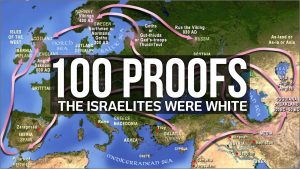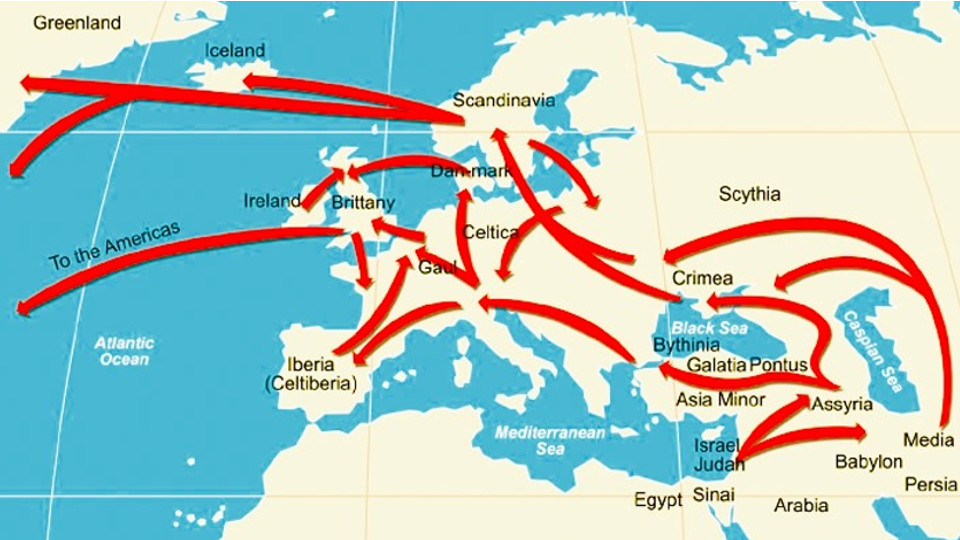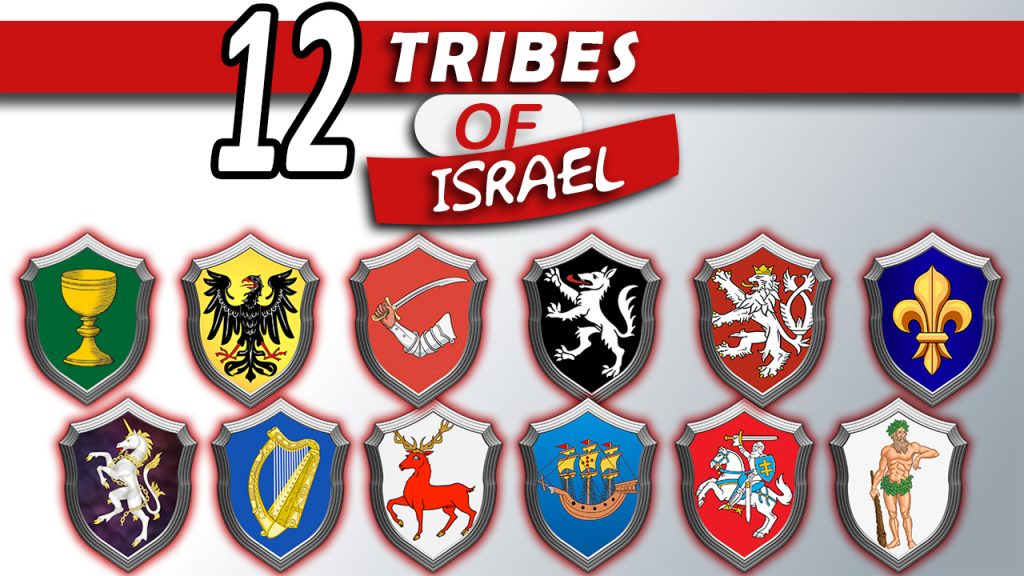100 Proofs The Israelites Were White - Part 11
Proof 11 - Paul's Letters were to Europeans and Europeans only

Out of all the Apostles, Paul was personally chosen by Christ and given a special mission, which was to spread the Gospel to the dispersed children of Israel in Europe. This is revealed in Acts chapter 9, where Christ commands Hananias to find Paul and states the true purpose of Paul’s mission. Which is to bear Christs name before the Nations and kings of the sons of Israel.
“But the Prince said to him “Go! For he is a vessel chosen by Me who is to bear My Name before both the Nations and kings of the sons of Israel” Acts 9:15.
This verse is often mistranslated as “the Gentiles and Kings, and the children of Israel” as though Paul was going to three separate groups of people. But once the true translation is accurately understood, we see that Paul was only sent to the nations and kings OF the sons of Israel.
So logically speaking wherever Paul traveled to, wherever he concentrated his ministry, surely that must be where the children of Israel were located. And as we’ve also explained in the past 10 Proofs the children of Israel had long been dispersing into Europe and by the time of Christ, they had come to dominate it. So it all makes sense. Now was the perfect time for the Gospel of Christ to be spread to them and reconcile them with their God, Yahweh, once more under Christainity. Paul would largely be the man used by Christ to accomplish this.
PAUL'S LETTERS
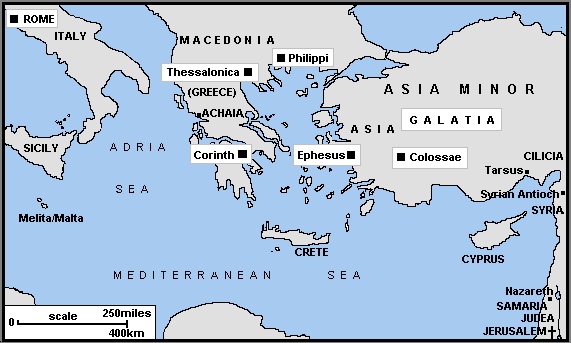
If we examine the Epistles of Paul, discounting the four epistles Paul had written to individuals, there are eight letters in total. These eight general epistles are addressed to the Romans, Corinthians, Galatians, Ephesians, Philippians, Colossians, Thessalonians, and Hebrews. All of these peoples, except for Hebrews, were within Italy, Greece, and Asia Minor. It’s clear that Paul was only interested in spreading the Gospel to the European people and that he believed that is where the children of Israel were located.
So as we’ve explained, The Romans were descended from the Trojans and thus were Israelites from Judah Zarah. All Greek historians accepted that. When you think about it Judah did come to rule over all of Europe through the Romans. After the Germanic Kings also descended from Judah ruled over us.
The Corinthians and Thessalonians were Dorian Greeks, so they were Israelites as well. The Dorians invasion happens roughly three generations after the Trojan War, which can be dated to around 1200 BC. Most of West Greece became dominated by the Dorian stock of Greeks, of which the Lacedaemonians or the Spartans became the most dominant.
The Philippines were Macedonians, were a mix of Danaan and Dorian Greeks so again Israelites. The Danaan Greeks came a bit earlier than The Dorians, they split off from the Israelites during the Exodus.
The Ephesians and Collosians were once Phoenician colonies. Of course the Phoenicians colonized locations virtually spread all over Europe.
Lastly the Galatians were Gauls who had come from the migrations of Israelites from Assyria. They overran a lot of Greece and Rome before settling in Europe. But in the 2nd century some tried to push back into Greece and ended up with a small province called Galatia in Asia Minor.
So in addition most of these cities had been first dominated by Macedonians and then Romans over the past few centuries prior to Christ. So all these places were Israelites cities and cultures that Paul was writing to and personally visiting.
Why did Paul not write to any other continent? The answer is Israel was almost exclusively found in Europe. Most Israelite Europeans had forgotten their heritage and had turned to paganism. Paul’s ministry was to bring the Israelite people of Europe back to God in Christ.
If we go a little deeper and examine the actual context of Paul’s Epistles we see that Paul was in fact addressing all these people as the descendants of the Israelites of the Bible. This is no mistake as Paul understood the history of the migrations.
ROMANS
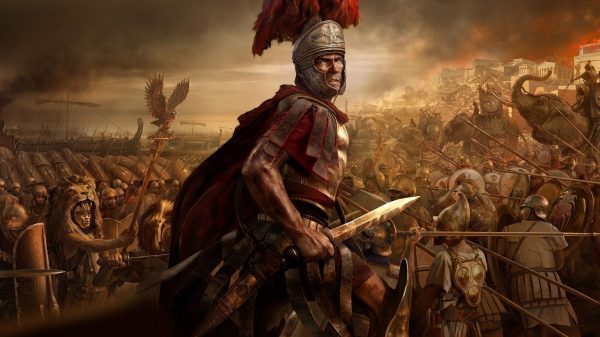
Let’s start with Paul’s Epistle to the Romans, in it he greets the Romans as “saints,” which is a designation given only to the children of Israel. Modern denominational churches try to claim that only the Church or the Pope or whoever, can ordain a person to be a saint. This is all a lie, when Isaac was put on the altar he became the property of Yahweh, thus a saint which means dedicated to Yahweh. This was passed on to Jacob and all his descendants. So only the children of Israel are born the saints of Yahweh. Understanding this we realize that Paul understood the Romans were the children of Israel.
Now most Bible versions add in the words to be saints. As if later in time the Church or Pope or whoever will make them saints. But Paul acknowledged all of them there and then as saints.
“To all those in Rome who are beloved of Yahweh, called saints: favor to you and peace from Yahweh our Father and Prince Yahshua Christ” Romans 1:7 CNT.
Continuing, a few verses later in his Epistle, Paul acknowledges that the Romans at one time knew Yahweh but have turned away from him, now how can the Romans have known the God of Israel, unless they were Israelites or descended from the Israelites? Only then what Paul is saying makes perfect sense.
He continues, that they had corrupted their understanding and turned the incorruptible invisible Yahweh into statues and idols and even animals. This happened with the expansion of the Roman Empire and the need for toleration of foreign gods, and all which eventually led to the worship of the Emperor himself.
“Because knowing Yahweh, they thought of Him not as God, nor were they thankful; but they became foolish in their reasonings, and were darkened, their hearts void of understanding: 22 alleging to be wise they became fools, 23 and they changed the estimation of the incorruptible Yahweh into a resemblance of an image of corruptible man, and birds, and four-legged animals, and reptiles” Romans 1:21-23 CNT.
Yahweh revealed himself to the children of Israel alone, and Yahweh acknowledged having known only the children of Israel. For the Romans to have once known Yahweh, they must have been descended from the Israelites.
“You only have I known of all the families of the earth: therefore I will punish you for all your iniquities” Amos 3:2 KJV.
But there’s more to prove that the Romans were Israelites. In old Latin, the supreme God Jove of the Romans, which was actually spelled with an I and not a J, as in “I-ove.” This was pronounced Yoh-weh or Yah-weh. We just went over the letters last proof, so if you recall the I letter could be both a Y/J type sound or could serve as a I vowel like sound. Such as in Julius Caesar, it was actually spelt like this, here the “v” would be a “u” type sound, but as for the “i” at the start is a “y” sound, but the 2nd “i” an “i” sound so it’s pronounced Yulius.
As for that V in Jove, it was actually a “w” sound or as we just showed it could be used a vowel like “u” sound. Back to Caesar again his famous quote I came, I saw, I conquered spelt veni, vidi, vici was actually pronounced with a “w” sound so weni, widi, wichee.
Back to Jove, if we put all the correct sounds together, we get Y, O, W, E, you see how the pronunciation becomes Yoh-weh or Yahweh.
As for the later name Jupiter, which became more popular than Jove it was simply a combination of Jove or Jo for short and Pater. Pater means father in latin, so put it together you get Father Jove or Jove the Father. So in other words the Roman God Jove was Yahweh, but as we said the Romans introduced a whole pantheon of false gods and even introduced the worship of the Emperor.
Furthermore, later on in his Epistle, Paul states that the Romans were a wild olive branch that had been broken off from the main cultivated olive tree. Paul understood that the Romans came from the Trojans and that the Trojans were Israelites who had broken away from the main body of Israelites before the Exodus. Thus they never received the law through Moses and were a “wild olive branch” compared to a “cultivated olive branch.” In Paul’s comparison “wild” means without the law from Sinai, and “cultivated” refers to the children of Israel who received the law. Nevertheless the Romans were still Israelites
“Moreover they also, if they do not remain in disbelief, shall be grafted in; indeed Yahweh is able to graft them in anew. If you from out of a naturally wild olive tree had been cut off, and contrary to nature had been grafted into a cultivated olive tree, how much more can those natural ones be grafted into their own olive tree?” Romans 11:23 CNT.
As we will see, all of Paul’s recipients of his Epistles were Israelites who had left the main body of Israelites at different times. The Roman’s ancestors left even before the Exodus.
CORINTHIANS
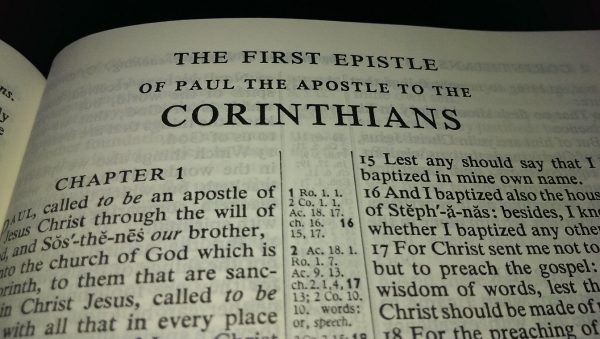
Let’s look at another one, in Paul’s Epistle to the Corinthians, he states that our fathers were under the cloud with Moses and they had both passed through the Red Sea together, that they ate the spiritual Mana from heaven and drank from the rock in the wilderness that was Christ. So Paul was talking about his own Israelite ancestors and the ancestors of the Cornithians, who were also Israelites. In other words, he acknowledged kinship with the Corinthians as fellow descendants of the Israelites.
“Now I do not wish you to be ignorant, brethren, that our fathers were all under the cloud, and all had passed through the sea. And all up to Moses had immersed themselves in the cloud and in the sea, and all had eaten the same spiritual food, and all drank the same spiritual drink; for they drank of an attending spiritual rock, and that rock was Christ” Corinthian 10:1-5 CNT.
To understand how this could be, we need to understand the history of ancient Greece. The Corinthians were Dorian Greeks. There were three main types of Greeks: Danaans, Dorians, and Ionians. The first two, the Danaans and the Dorians, were Israelites who had gradually migrated to Greece leaving the main body of Israelites.
The reason they are called Dorians, can only be because they originated from the city of Dor in Palestine. Dor was within the territory of the tribe of Manasseh, so no doubt many of these Dorians were from the tribe of Manasseh. This migration would have happened after the invasion of the lands of Canaan under Joshua, but long before the Assyrian deportations.
Once again Paul must have understood the history of the migrations of Israelites to Greece, and that is why he acknowledges that their ancestors were once with Moses. This is further proven in the letter between a Spartan King Areus and the High-Priest of Judea. The Spartans acknowledge that they were derived from the stock of Abraham. The letter is in both Maccabees and preserved in the writing of Flavius Josephus.
“Areus, King of the Lacedemonians, To Onias, Sendeth Greeting. We have met with a certain writing, whereby we have discovered that both the Judaeans and the Lacedemonians are of one stock, and are derived from the kindred of Abraham. It is but just, therefore, that you, who are our brethren, should send to us about any of your concern as you please. We will also do the same thing, and esteem your concerns as our own, and will look upon our concerns as in common with yours. Demotoles, who brings you this letter, will bring your answer back to us. This letter is foursquare; and the seal is an eagle, with a dragon in his claws.” Antiquities 12.4.10
This proves that the Spartans in their writings understood they were Israelites descended from Abraham.
GALATIANS
But that’s not all. In Paul’s Epistle to the Galatians he explains the law given on Sinai was our tutor for Christ. The only way he could say that to the Galatians is if they too had once been under the law and the laws of Moses were only ever given to the children of Israel. Nobody else had ever been under the law.
“So the law has been our tutor for Christ, in order that from faith we would be deemed righteous. But the faith having come, no longer are we under a tutor; for you are all sons of Yahweh through the faith in Christ Yahshua” Galatians 3:23 CNT.
The Galatians were Gauls who had come back to Greece and attempted another invasion. The Gauls were the same stock as the Scythians and Cimmerians who were Israelites who migrated to Europe once the Assyrian Empire fell. The name Galli or Gauls is a Roman shortening of the Greek name Galatea. They had rampaged through Europe, invading Greece and then Italy until finally settling in Gaul or what we call France today, as well all of Europe.
The Galatians upon reinvading Greece had little success this time around and a portion of them had settled in Anatolia which would be modern West Turkey. They had carved out a part of the land and named it Galatia. So these were Israelites who had left Palestine with the Assyrian deportations.
LYCAONIANS & ATHENIANS
What is often overlooked and further proves that Paul’s epistles were only to the children of Israel, is Paul’s interaction with Lycaonians and Athenians on his travels. Both of these people were Ionian Greeks and thus not Israelites but Adamaties from Javan, from Japheth. Paul had addressed the Lycaonians in Acts chapter 14, and Athenians in Acts chapter 17 we will concentrate on that section here.
Here we will see that Paul’s message is very different. First Paul noticed all the objects of worship in the city, but that they had one statue dedicated to the unknown God. The Athenians did not know Yahweh.
He tells them that Yahweh does need a temple, since he created the entire world and breathed life into everything. In other words, what is a temple compared to the entire world?
Continuing Paul mentions the Genesis 10 boundaries of the nations, the nations that came from Noah, and that if the Athenians truly sought out God then they would find him.
He gives general warnings against idolatry. Which is fair all of Noah’s descendants went off into idolatry and what’s why Yahweh created the nation of Israel.
Lastly Paul warns them to repent of this and speaks of a general resurrection of the dead. Now all Adamites have this promise that one day they will be brought back to life because Yahweh breathed an immortal spirit into Adam, so all Adamites inherit this spirit.
This promise is first found in Genesis 3:22, where Yahweh is telling Adam that he must only eat of the tree of life, the tree of life is Christ and his Adamic race, so eating is a euphemism meaning as long as Adamites marry Adamites, then there descendants will inherit that immortal spirit and thus a resurrection in the afterlife so they will live forever.
So back to Paul, notice here that had said nothing of Christ, not one mention. Nothing of sin, redemption, covenants, adoption, because the Athenians were not descended from the Israelites even though they were descended from other sons of Noah.Whilst Christ did come to redeem the Adamic race for a resurrection, the Gospel itself was only intended for the children of Israel who would inherit the world as Christians.
So when Paul addressed the Athenians, he addressed them just generally as Adamites with the general promises made to the entire race of Adam. But he had a seperate message whenever he spoke to the descendants of the children of Israel. This demonstrates that Paul’s mission was to spread the Gospel, Christianity only to the children of Israel and that he had an understanding of history and the ancient migrations of his people.
PAUL’S TRIAL
After all of Paul’s travels through Greece and Asia Minor, he returned to Jerusalem and was arrested. At his trial, he confessed that during all that time he had been serving the twelves tribes of Israel and for that reason was being persecuted by the Judeans. This only makes sense if the places and people he was going to were in fact part of the dispersions of the twelve tribes of Israel.
“And now for the hope of the promise having been made by God to our fathers I stand being judged, for which our twelve tribes serving in earnest night and day hope to attain, concerning which hope I am charged by the Judaeans, King:” Acts 26:7-8 CNT.
Indeed, Paul was the Apostle to dispersed Israelites, this is why back in Galatians, a verse that is often taken way out of context, WHere Paul states he has been entrusted to spread the message to the uncircumcised, whilst Peter and the other Apostles to the circumcised. What Paul means is the Israelites who had dispersed to Europe, had forgotten their heritage, and long ago given up circumcision. So it was Paul’s mission to reunite these lost sheep of the house of Israel with Yahweh who is Christ, reuniting them once more with their God.
As we’ve stated in previous Proofs, this fulfills the prophecy in Hosea where Israel would commit adultery on Yahweh, cheating on Him if you will, with numerous other religions, worshiping other false gods. However, eventually to return back to Yahweh through Christ who is Yahweh. Thus returning back to their original first husband.
“And she shall follow after her lovers, but she shall not overtake them; and she shall seek them, but shall not find them. Then shall she say, ‘I will go and return to my first husband, for then was it better with me than now’” Hosea 2:7.
The Europeans all became Christians, accepted Christ as their God and thus were reunited with their first husband, Yahweh. Whether they understood that fully or not is irrelevant. The prophecy was fulfilled.
CHURCHES OF REVELATION
It is not just Paul’s ministry and his epistles that demonstrate that the Israelites had been dispersing into Europe. The Revelation of Yahshua (Jesus) Christ also proves it. All seven churches of the Revelation were in this one small area of Anatolia.
These seven locations were Ephesus, Smyrna, Pergamos, Thyatira, Sardis, Philadelphia and Laodicea. Whilst one could argue that several of these had at one point been controlled and populated by other Adamic nations such as the Lydians who came from Lud, or Phyrgians who were from the Thracians from Tiras, or Persians who came from Elam. As we’ve said these places had become dominated by Macedonians Greeks and then Romans. In other words they were all now populated by white Europeans who were descended from the Israelites.
So whilst there is a hidden message in the names of each Church, as the meaning describes the characteristics of the greater body of Christians throughout the centuries. We will have to go through that in another proof. The point is the locations of the churches were all Israelite Europeans. This is why these seven locations were chosen by Christ and not seven locations on any other continent, he chose Europe that’s where the Israelites were.
EPISTLES OF PETER, JAMES & JOHN
But there’s more, lets have a look at the other Apostles’ Epistles. Starting with James, he opens his epistle with a greeting to the twelve tribes in the dispersion. Whilst James doesn’t specifically address where those twelves tribes are, it clearly shows the apostles knew the children of Israel were dispersed and had not faded away from history. Furthermore, all the other epistles of Paul and other apostles and the Revelation were clearly eurocentric. We can only imagine that James was writing to the same people and churches.
“Iakobos servant of Yahweh and Prince Yahshua Christ to the twelve tribes in the dispersion, greetings” Epistle of James 1:1 CNT.
In Peter’s first epistle, it was addressed to places within Anatalia once again, all being locations Paul had visited and written to, as well places in close proximity to the locations of the seven churches of Revelation. This all shows the one consistent message that the Israelites were in Europe.
“Petros, ambassador of Yahshua Christ, to the elect sojourners of the dispersion of Pontos, Galatia, Kappadokia, Asia and Bithunia, 2 according to the foreknowledge of Father Yahweh in a sanctification of the Spirit in obedience and a sprinkling of the blood of Yahshua Christ: favor to you and peace be multiplied” 1 Peter 1:1-2 CNT.
Furthermore, later on in the epistle Peter claims that the recipients are an elect race, a royal priesthood, a holy nation, and a peculiar people. Peter is quoting the same words Moses used to describe the Israelites in the Exodus. Why? Because they are the Israelites. That they have been called out of darkness into the light. That the new Christians were people who at one time had not been a people. Now he is quoting Hosea, And what he means it, the Israelites who had been deported were no longer a united people and had not been shown mercy and there were in darkness, but they now were being reconciled to Yahweh through Christianity and thus were being shown great mercy and in the light. This all proves that the people Peter is writing to are the lost children of Israel.
“But you are an elect race, a royal priesthood, a holy nation, a peculiar people, so that you should proclaim the virtues for which from out of darkness you have been called into the wonder of His light, 10 who at one time were ‘not a people’ but now are the people of Yahweh, those who ‘have not been shown mercy’ but are now shown mercy” 1 Peter 2:9-10.
As for John, We do not know the recipients of his epistles, as they are unnamed. However we can rest assured from the language of the epistles that they were written to local Christians, and we know from many early Christian sources that John was in Ephesus during the final years of his life, both before and after his exile on the isle of Patmos in the Aegean Sea.
In his first epistle John addressed his readers as “my little children,” a formula which seems to be the words of an elder to the younger members of his congregation. During his years in Ephesus, John certainly fits that description. So his second epistle was written from “The elder unto the elect lady and her children, whom I love in the truth…” and with whom he certainly seems to have had a personal relationship. Likewise, the third epistle is written from “The elder unto the wellbeloved Gaius, whom I love in the truth.”
Lastly the fact that John was in Ephesus, where Paul had spent three years founding the first Christian assemblies, and that all of the churches of the Revelation are located in places where Paul had preached, shows that both apostles were certainly of the same mind in respect to their intended audience.
CONCLUSION
When we put all the pieces together, it all paints a picture of the Israelites being in Europe and the apostles seeking them out as fishermen as Christ said they would. That even though the Israelites had dispersed and had forgotten they were Israelites, Yahweh God never forgot about them and regathered and reconciled himself to them, making us one people once more. As the Christian people in Christian Europ
